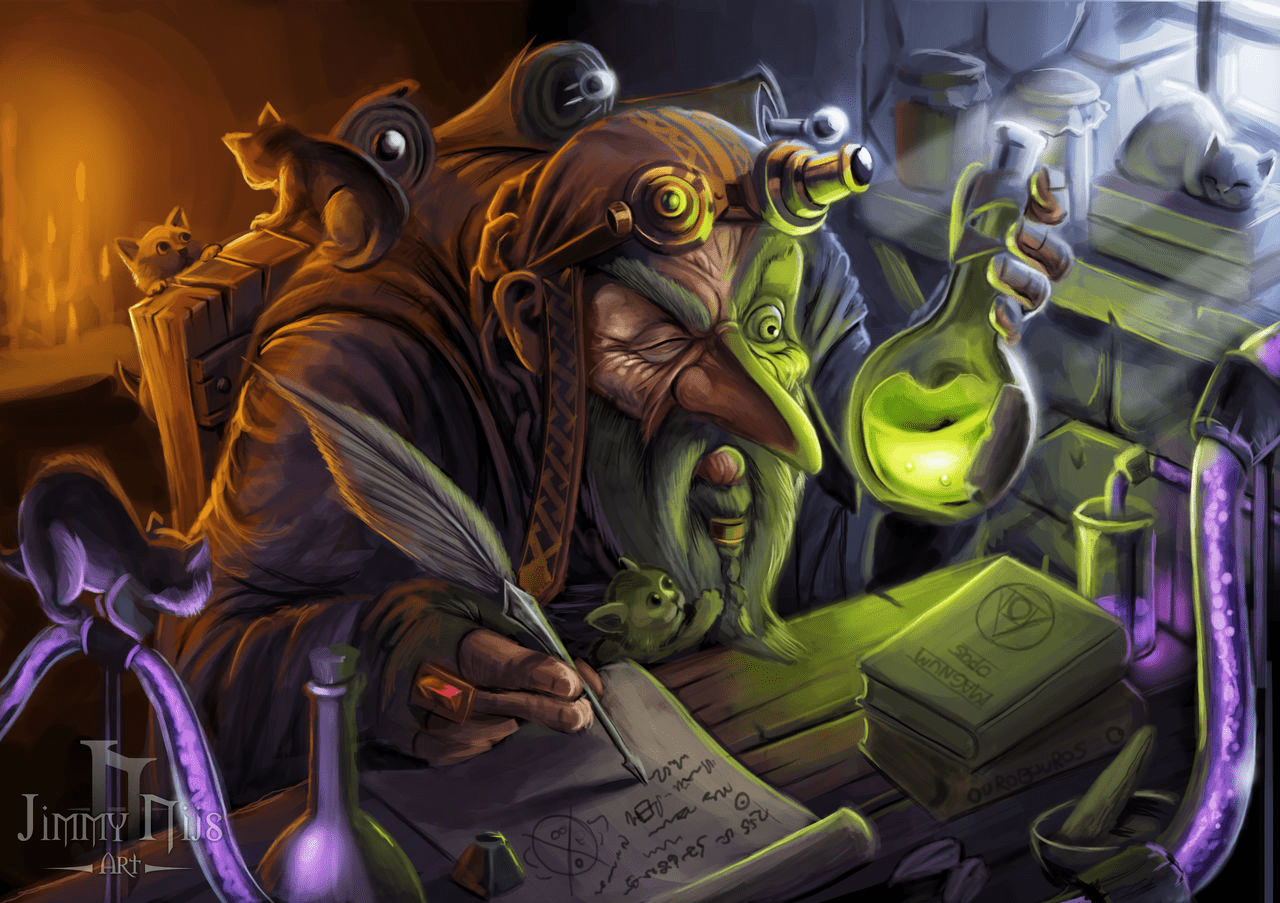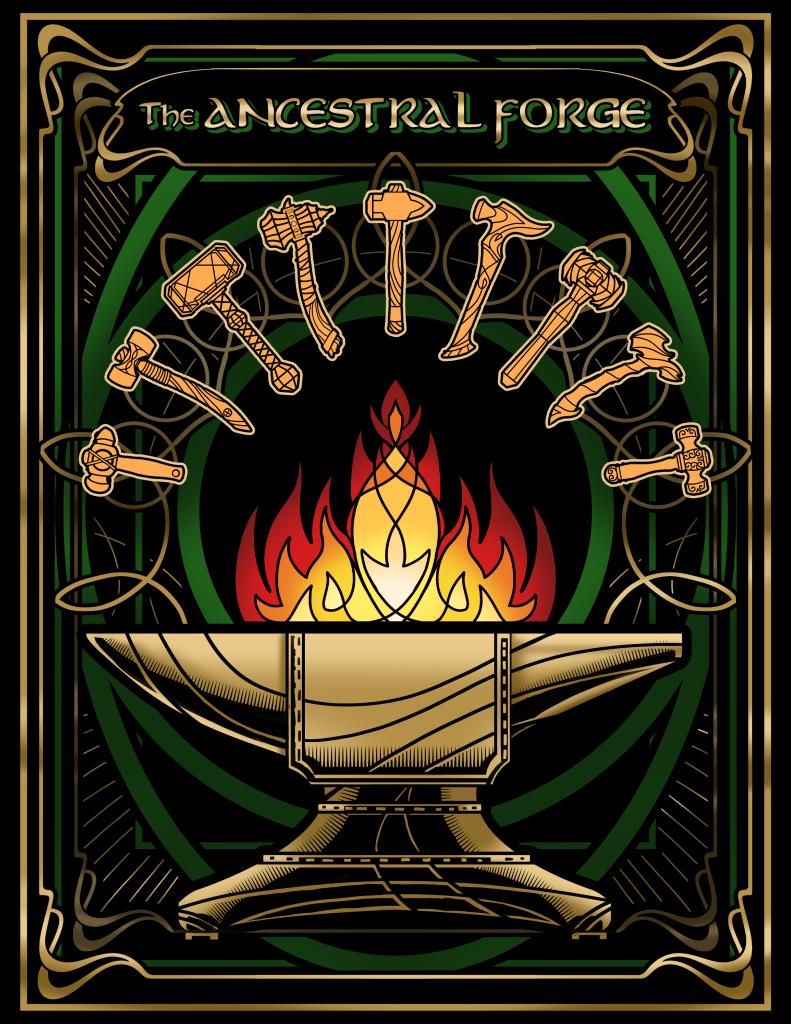D&D 5e: Alchemist Artificer Guide

D&D 5e: Alchemist Artificer Guide
Role in the Party
The Alchemist Artificer is an unusual subclass; the Artificer is a very complex class with many features, but it lacks straightforward power. Every subclass except for the Alchemist does something to boost the power level, either through Extra Attack, adding another entity on the battlefield or both in Battle Smith’s case. The Alchemist does not get either of these, and their features are disappointing as substitutes.
The Alchemist is meant to be a support artificer that buffs its party members with elixirs and has powerful cantrips: although it can fill this role to some extent, the features don’t support this all that well.
Epic
Good
Meh
Bad
The Alchemist Artificer subclass is found in Eberron: Rising from the Last War AND Tasha’s Cauldron of Everything. Click here to pick up your own copy of Ebberon: Rising from the last War OR Click here to pick up your own copy of Tasha’s Cauldron of Everything !
Alchemist Features
Tool Proficiency
When you adopt this specialization at 3rd level, you gain proficiency with alchemist’s supplies. If you already have this proficiency, you gain proficiency with one other type of artisan’s tools of your choice.
This is not a powerful feature, but it’s not meant to be powerful. It just ensures your alchemist will always be proficient in the tools related to the subclass.
Alchemist Spells
Starting at 3rd level, you always have certain spells prepared after you reach particular levels in this class, as shown in the Alchemist Spells table. These spells count as artificer spells for you, but they don’t count against the number of artificer spells you prepare.
3rd level: Healing Word and Ray of Sickness. Healing Word is a good healing spell to use when someone is at zero hit points, but Ray of Sickness is underwhelming and requires a successful attack and a constitution save to poison someone, and the damage is bad. Notably, the Shield spell is not present: you will not have the incredible armor class of some other artificers unless you get this spell through other means.
5th level: Flaming Sphere and Melf’s Acid Arrow. Flaming Sphere is a great bonus action damage option, and Melf’s Acid Arrow is a bad action damage option. Alchemists don’t have a built-in bonus action like the Battle Smith, so Flaming Sphere is unusually good on them.
9th level: Gaseous Form and Mass Healing Word. Gaseous Form is a circumstantial utility spell, and Mass Healing Word doesn’t do a ton of healing, but it affects multiple creatures and can save multiple lives in a pinch.
13th level: Death Ward and Blight. Death Ward lets you cast a spell on someone before combat and let them take an extra instance of damage before dying, or completely ignore a Power Word Kill, and Blight does terrible damage. Don’t use Blight.
17th level: Cloudkill and Raise Dead. Cloudkill does poison damage, which is fine at lower levels, but nearly everything is resistant or immune to it at high levels. It’s also a constitution saving throw and doesn’t do a significant amount of damage against high CR creatures to begin with. Raise Dead would be good if nobody else had it, but unfortunately, you are 17th level and someone almost certainly already has this on their spell list, or at least the ability to replicate Raise Dead with the Wish spell.
Experimental Elixir
Beginning at 3rd level, whenever you finish a long rest, you can magically produce an experimental elixir in an empty flask you touch. Roll on the Experimental Elixir table for the elixir’s effect, which is triggered when someone drinks the elixir. As an action, a creature can drink the elixir or administer it to an incapacitated creature.
You can create additional experimental elixirs by expending a spell slot of 1st level or higher for each one. When you do so, you use your action to create the elixir in an empty flask you touch, and you choose the elixir’s effect from the Experimental Elixir table.
Creating an experimental elixir requires you to have alchemist supplies on your person, and any elixir you create with this feature lasts until it is drunk or until the end of your next long rest.
When you reach certain levels in this class, you can make more elixirs at the end of a long rest: two at 6th level and three at 15th level. Roll for each elixir’s effect separately. Each elixir requires its own flask.
To understand why this isn’t a good feature, we need to look at the options first, which are chosen by rolling 1d6 for the random daily elixirs:
Healing. The drinker regains a number of hit points equal to 2d4 + your Intelligence Modifier.
Swiftness: The drinker’s walking speed increases by 10 feet for 1 hour.
Resilience: The drinker gains a +1 bonus to AC for 10 minutes.
Boldness: The drinker can roll a d4 and add the number rolled to every attack roll and saving throw they make for the next minute.
Flight: The drinker gains a flying speed of 10 feet for 10 minutes.
Transformation: The drinker’s body is transformed as if by the Alter Self spell. The drinker determines the transformation caused by the spell, the effects of which last for 10 minutes.
Artificers have cure wounds: the average for the healing option is almost identical to cure wounds. Another creature can administer it for you, but it still costs someone’s action.
Swiftness is just Longstrider. Longstrider is a mild buff and it’s 1st level. Resilience and Boldness are about equal to a 1st level spell since they’re worse versions of Bless and Shield of Faith but have no concentration. Boldness does stack with bless, but it costs an action to use. Transformation lets you give one party member the benefits of Alter Self, which is an underwhelming 2nd level spell, so about as good as a 1st level spell.
Flight is the best one because it’s concentration free flight, but the flying speed is extremely slow. It will not help melee allies defeat flying enemies, and if you use this on an ally to protect them from an enemy, they’ll just attack someone else instead.
So if all of these are as good as a 1st level spell, we’re not really getting much by using a 1st level spell slot to use them, except maybe for Flight and Transformation in certain circumstances. Level 3 artificer features are usually much better: Battle Smith turns you into a weapon user gish with a ridiculous armor class and gives you a robot companion with offensive and defensive potential! The option to use our 1st level slots on things similar to 1st level spells is not anywhere close to what other artificers get.
Alchemical Savant
At 5th level, you’ve developed masterful command of magical chemicals, enhancing the healing and damage you create through them. Whenever you cast a spell using your alchemist’s supplies as the spellcasting focus, you gain a bonus to one roll of the spell. That roll must restore hit points or be a damage roll that deals acid, fire, necrotic, or poison damage, and the bonus equals your Intelligence modifier (minimum of +1).
If you have 20 intelligence and attack with a firebolt, you can deal 2d10+5 fire damage. This is not good damage compared to any damage-focused character. Acid Splash is slightly better since you can deal 2d6+5 to two enemies, but only if they’re next to each other. You also can’t benefit from using an infusion as a spellcasting focus, because you must use your alchemist’s supplies as the spellcasting focus. Your healing is also slightly stronger, which can help, but it’s not a big deal. It’s also ambiguous as to whether or not a spell like Flaming Sphere gets a boost to the first damage roll or no boost at all, since it doesn’t do damage immediately after being cast.
Restorative Reagents
Starting at 9th level, you can incorporate restorative reagents into some of your works:
Whenever a creature drinks an experimental elixir you created, the creature gains temporary hit points equal to 2d6 + your Intelligence modifier (minimum of 1 temporary hit point).
You can cast Lesser Restoration without expending a spell slot and without preparing the spell, provided you use alchemist’s supplies as the spellcasting focus. You can do so a number of times equal to your Intelligence modifier (minimum of once), and you regain all expended uses when you finish a long rest.
The temporary hit points finally make your elixirs better than a 1st level spell by combining an effect with 2d6+intelligence temporary hit points. However, this doesn’t make them good, just less bad. Getting Lesser Restoration for free can be handy, but only if nobody else has it prepared, and you probably don’t ever need to cast it more than once per day. Most adventuring days never require Lesser Restoration.
Chemical Mastery
By 15th level, you have been exposed to so many chemicals that they pose little risk to you, and you can use them to quickly end certain ailments:
You gain resistance to acid damage and poison damage, and you are now immune to the poisoned condition.
You can cast Greater Restoration and Heal without expending a spell slot, without preparing the spell, and without providing the material component, provided you use alchemist’s supplies as the spellcasting focus. Once you cast either spell with this feature, you can’t cast that spell with it again until you finish a long rest.
The resistances are okay, and free Greater Restoration is nice. The free Heal is the best part of this feature since Heal is an excellent spell, but you’re 15th level and this is your subclass’s capstone.
Read More: Complete 5th Edition Artificer Guide
Strengths
You gain concentration-free flight at level 3; even though it costs spell slots and has a short duration and is slow, it’s a unique feature that is likely to be useful in some scenarios. You can also be a reliable source of Lesser Restoration and Greater Restoration if your dungeon master likes throwing enemies at you that make these spells extremely useful. Finally, if you have opportunities before combat to stock up on buffs, elixirs aren’t a horrible option.
Lastly, if you make it to level 20, you have the lovely artificer capstone which gives you more attuned items and +6 to all saving throws, and the ability to avoid dropping to 0 HP by ending an infusion.
Weaknesses
You have worse damage options than any other artificer and worse options than most characters. Unless you multiclass, the best you can do is flaming sphere plus a cantrip, but your slots are limited at the level you learn the spell and fire immunity becomes much more common at high levels. You also don’t have the casting power to use the best support spells, which hurts if you wanted to be a support character. Elixirs are also fueled by the spell slots from your half casting, so you’re incredibly tight on spell slots at all times. You’re mostly a worse version of other characters.
Best Race Options
Custom Lineage and Variant Human are good on almost any build. An alchemist interested in using concentration spells to support allies may want to take War Caster as one of these races; this lets them avoid losing concentration and having to re-cast the spell, which is horrible when you have highly limited spell slots.
If you’re jealous of other artificers and their Shield spell, the Githzerai race gives it to you, allowing you to take on a tank role in addition to dealing mild damage and being capable of mild support. You can also read minds and you have telekinesis, so you’ll be fun out of combat too. However, casting Shield beyond the free use will cost you one of your very limited spell slots.
The Monsters of the Multiverse version of the Hobgoblin allows you to take the help action as a bonus action; since unless you have a homunculus, you don’t have a bonus action every round like the Battle Smith or Artillerist, this is a good way to use your bonus action when your Flaming Sphere isn’t up. You can also use the power of friendship to give yourself boosts to your rolls, letting you succeed on important ability checks out of combat and important saving throws in combat.
Choosing the Right Skills
You likely have a high intelligence score, and intelligence is a common dump stat, so your party may depend on you to make Arcana, History, Nature, Investigation, and Religion checks. You don’t have to be proficient in all of these, but it’s good to at least be proficient in Arcana since it’s usually the most common intelligence skill in a campaign.
Perception is useful for any character. You will spot hidden creatures and traps before they can kill you, and you will notice extra details about situations in general.
Even if you have teleportation options, it’s always handy to have one skill to help you escape a grapple or perform physical things: since you have medium armor proficiency and need some dexterity to use medium armor well, Acrobatics is probably ideal, but if you multiclassed for heavy armor, you might consider Athletics instead.
You’re an alchemist who makes potions that affect humanoid bodies, so Medicine makes thematic sense. You’re unlikely to use it very often, but it can be fun to have.
Fitting Feats
Magic Initiate: Wizard or Strixhaven Initiate let you select the Find Familiar spell: you can use this disposable scout for all kinds of utility and generate advantage in combat with this spell, synergizing excellently with the next two feats (but not both at once).
If you went with an elf race, Elven Accuracy will make your cantrips almost always hit if you have advantage. You may not hit hard, but you will almost always hit, so your damage will at least be reliable. This is a good level 4 pick, especially if you started with an odd intelligence score
Great Weapon Master is an unusual option, but with multiclassing, it’s one way to deal decent damage as an Alchemist: see the multiclass guide for details.
Optimal Backgrounds
Guild Artisan is a sensible background for any artificer; it makes sense that the person who’s good at crafting would have this background. Guild Membership should be easy to cover with adventuring income while giving you the backing of a powerful political entity, and you have the skills to justify your presence in the guild.
If Ravnica backgrounds are allowed, Simic Scientist is a powerful pick. You’re a mad scientist interested in biological experiments, and your elixirs fit in well. You gain a few spells in your spell list, including the excellent Polymorph: you get it much later than other spellcasters, and it’s not as good at 13th level as it is at 7th level, but it can still be immensely useful. Turn your friends into giant apes and t-rexes.
Far Traveler doesn’t give you much mechanically, but it is a good way to justify having an artificer in a setting where alchemy and the technology-oriented features don’t fit in. You may consider this if your dungeon master is otherwise lovely but has reservations about artificers in particular.
Multiclassing Options
Taking one level of Fighter can turn the Alchemist into a serviceable melee combatant and tank. You won’t be great at it, but if you combine Great Weapon Master with a greatsword, a blade cantrip, and occasionally Flaming Sphere or the homunculus infusion, and you also have a familiar give you the help action, you might do okay damage and have leftover spell slots to help your friends. Treantmonk’s Alchemist Artificer Guide video goes into detail on the build. However, the familiar is prone to dying, and not all tables are enthusiastic about familiars using the help action, so watch out for that.
Taking a few levels of Warlock and taking numerous short rests can give you a ton of elixirs. Not every dungeon master will approve of this strategy, since it’s somewhat of an exploit and the dungeon master can reasonably rule that you can’t take eight short rests in a row every day, but it lets you make up for low quality with a high quantity. You could give your whole party a 10 foot flying speed, letting you defeat land-based melee creatures with no effort. You could either take two levels of warlock on an alchemist, or you could take three levels of alchemist on a warlock: the latter is likely more powerful. If you’re taking a few levels as a character who’s mostly an Alchemist Artificer, the infamous Hexblade may be the best option.
One level of Peace Cleric can turn you into a buffing powerhouse. Emboldening Bond’s d4 can be added to both the Bless d4 and the Boldness d4, allowing you to push allies past the limits of bounded accuracy with an extra 2d4 or 3d4 to all attacks and saving throws. However, assuming you use Emboldening Bond out of combat, it takes your action to cast the Bless spell, and then the actions of everyone else to drink their Boldness elixirs, which is almost certainly impossible to do out of combat most of the time due to the short duration. It also doesn’t solve the spell slot expenditure required to buff everyone.
Would I recommend playing an Alchemist Artificer?
It’s difficult to recommend the Alchemist Artificer since, despite a few unique abilities, it doesn’t give you much overall. You’re mostly left with the core Artificer features, which were designed with more powerful subclasses in mind.
Although there is homebrew for the Alchemist—Mage Hand Press put out a decent one that’s its own class—you may not need to fix the Alchemist if you’re at a table where nobody is making powerful characters. Suddenly, you go from a character who’s bad at most things to a character that’s decent at everything, since nobody else is exceptionally strong either. At this kind of table, you can fill the role of a true generalist who can do damage, healing, battlefield control, buffing, debuffing, tanking, magic item distribution, and out of combat utility. However, at most tables, you will end up as one of the weakest party members.








